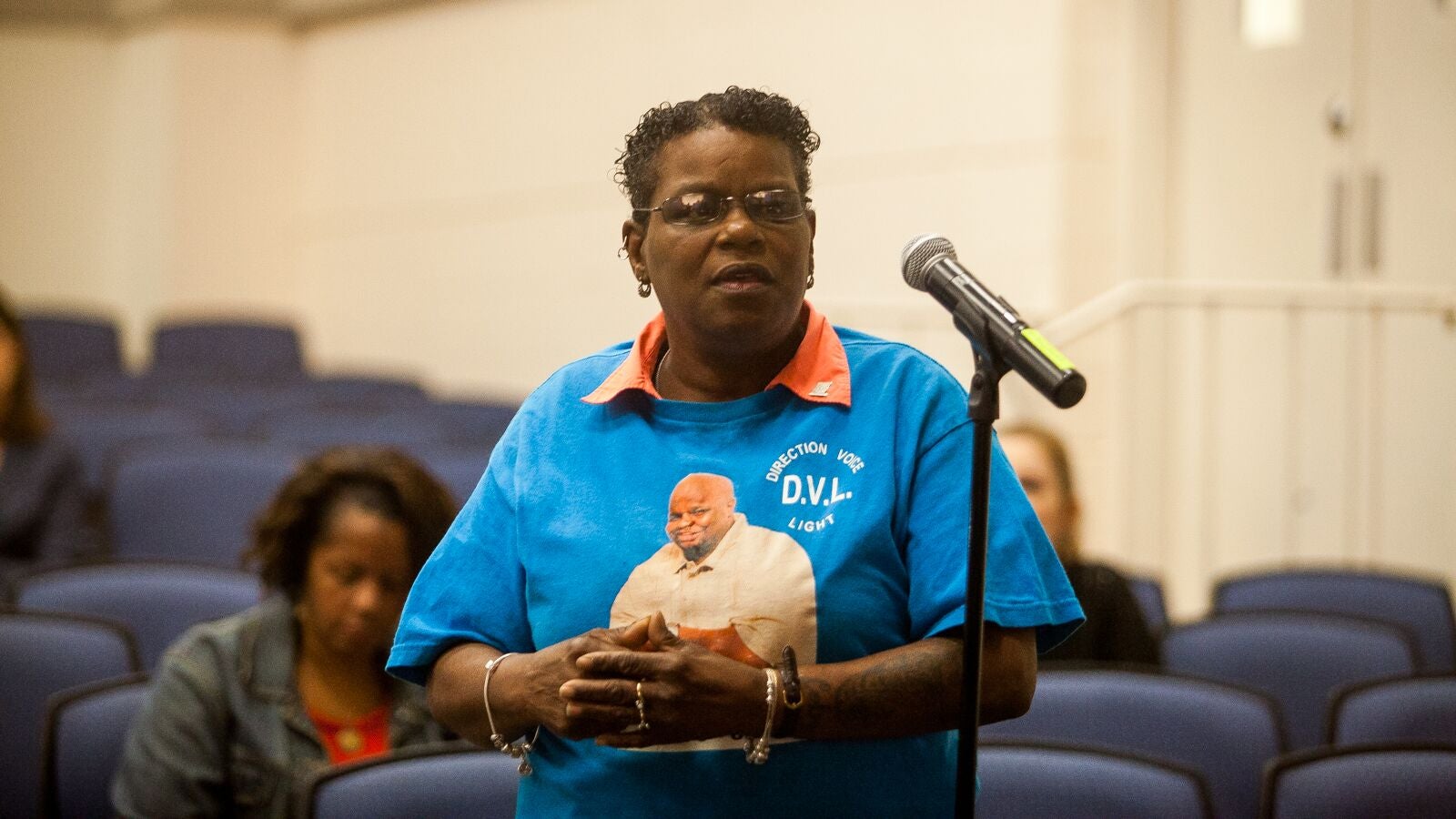‘They don’t like black people,’ Chester residents air grievances with police to Justice Dept.

Delphine Matthews speaks at a listening session between the DOJ and residents of Chester. On her shirt is a picture of her son
In the first step in what amounts to a voluntary overhaul of police practices in Chester, Delaware County, last night representatives of the U.S. Department of Justice asked for the local community to air their grievances with police.
And unload, they did.
Though fewer than 30 turned out, Chester residents used up the entire two hour time slot with stories of racial profiling and negative encounters with police.
“A white officer put a gun in my face, ‘Why you on the block,’ interrogating me,” said 29-year-old Malcolm Flamer, who said he was pulled over simply for visiting cousins who live on a “drug-riddled” block.
Residents like Flamer shared both personal accounts and general critiques of the police department. Officers were not present on purpose in order to encourage a more open dialogue.
Christina Delva was one of several people to mention a dearth of police on the street, especially in areas known to be hotbeds for gangs or drug dealers.
“They’re really not walking the beat either,” she said. “I can tell you locations where I consistently see police vehicles parked and officers sleeping inside of their cars.”
She also mentioned a lack of cross-cultural awareness as unnecessarily hindering a relationship between police and community members.
“They don’t understand our lingo, so when we use words like ‘ya’I’m saying,’ ‘ya’mean,’ they think we’re trying to disrespect them. And if they don’t understand how we interact, they automatically take offense, which is an issue,” said Delva.
Preschool teacher Regina Minter said that lack of cultural sensitivity and empathy — at its most extreme — leads to poor police work. “After a murder, you see cops for about an hour, no more,” she said. “They don’t care. They don’t like black people. They don’t like the young black boys in this city.”
Sitting on stage at Widener’s Alumni Auditorium, representatives from the Justice Department and a subcontractor named IIR took notes and sipped water. When possible, they answered questions about the evaluation process but said they didn’t know enough to speak to specifics about the current operations of the Chester police department.
Earlier this year, newly-elected Mayor Thaddeus Kirkland promised to bring the DOJ to Chester to examine the department’s use-of-force policy, as it has in thirty other cities across the country from Charleston to Philadelphia. Chester police have been plagued by community distrust, stemming in part from a number of police-involved shootings.
Some residents say that history and distrust have been fed by feelings of contempt from police.
“A year ago, I called Chester police to report that my car was broken into at 3a.m.,” Janae Avery told DOJ investigators. “And when they responded, they responded to me as though I was the criminal. I didn’t like the tone the officer used.”
The federal government won’t investigate the individual complaints voiced at the meeting, said DOJ representative Troy Williams, but will synthesize them into topics to the police can work towards, such as “mutual understanding, transparency, accountability.”
Listening session such as this one will take place two to three times during the two year evaluation process. The DOJ will also observe police, conduct one-on-one interviews with officers and community members to come up with a list of recommendations, and then monitor their implementation. The Department of Justice pays for the evaluation process, and may pay for some of the implementation costs.There is no way for the federal government to enforce any recommendations, which are voluntary.
Police Commissioner Darren Alston has said he is committed to following the DOJ’s guidance.
Many attendees acknowledged that their life in Chester has been made harder by rampant gun violence, and pleaded for police that would do more.
“Two-thousand-ten, I lost my brother to gun violence. Two-thousand-eleven, my son was shot in the eye,” said Frederick Bryant, choking back tears. “Give me some information on how they are going to get these guns out of these kids hands. My son didn’t have a gun, he was driving home from work.”
In response to the small turnout, several attendees vowed to bring more people to the next forum.
“If Chester don’t stand together, in laymen terms, we f—ked,” said Delphine Matthews, mother of Frank McQueen, a Chester resident shot to death by police during a shoot out.
“Have a good one,” she added.
WHYY is your source for fact-based, in-depth journalism and information. As a nonprofit organization, we rely on financial support from readers like you. Please give today.

